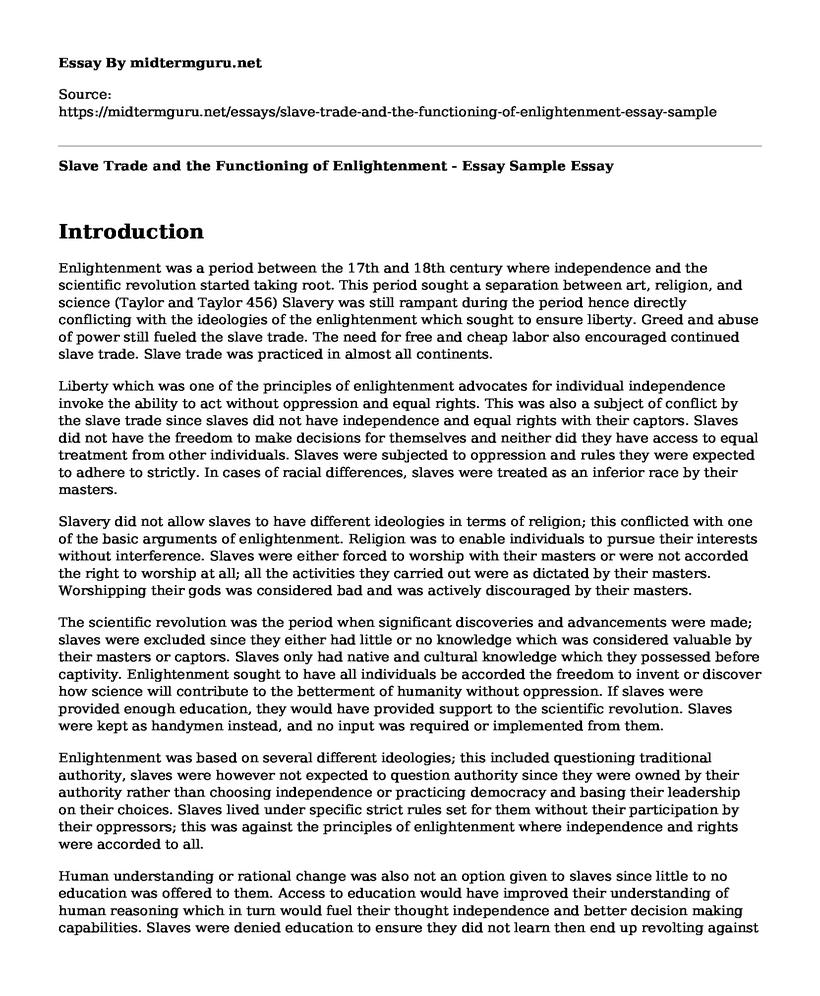Introduction
Enlightenment was a period between the 17th and 18th century where independence and the scientific revolution started taking root. This period sought a separation between art, religion, and science (Taylor and Taylor 456) Slavery was still rampant during the period hence directly conflicting with the ideologies of the enlightenment which sought to ensure liberty. Greed and abuse of power still fueled the slave trade. The need for free and cheap labor also encouraged continued slave trade. Slave trade was practiced in almost all continents.
Liberty which was one of the principles of enlightenment advocates for individual independence invoke the ability to act without oppression and equal rights. This was also a subject of conflict by the slave trade since slaves did not have independence and equal rights with their captors. Slaves did not have the freedom to make decisions for themselves and neither did they have access to equal treatment from other individuals. Slaves were subjected to oppression and rules they were expected to adhere to strictly. In cases of racial differences, slaves were treated as an inferior race by their masters.
Slavery did not allow slaves to have different ideologies in terms of religion; this conflicted with one of the basic arguments of enlightenment. Religion was to enable individuals to pursue their interests without interference. Slaves were either forced to worship with their masters or were not accorded the right to worship at all; all the activities they carried out were as dictated by their masters. Worshipping their gods was considered bad and was actively discouraged by their masters.
The scientific revolution was the period when significant discoveries and advancements were made; slaves were excluded since they either had little or no knowledge which was considered valuable by their masters or captors. Slaves only had native and cultural knowledge which they possessed before captivity. Enlightenment sought to have all individuals be accorded the freedom to invent or discover how science will contribute to the betterment of humanity without oppression. If slaves were provided enough education, they would have provided support to the scientific revolution. Slaves were kept as handymen instead, and no input was required or implemented from them.
Enlightenment was based on several different ideologies; this included questioning traditional authority, slaves were however not expected to question authority since they were owned by their authority rather than choosing independence or practicing democracy and basing their leadership on their choices. Slaves lived under specific strict rules set for them without their participation by their oppressors; this was against the principles of enlightenment where independence and rights were accorded to all.
Human understanding or rational change was also not an option given to slaves since little to no education was offered to them. Access to education would have improved their understanding of human reasoning which in turn would fuel their thought independence and better decision making capabilities. Slaves were denied education to ensure they did not learn then end up revolting against their masters; this maintained their vulnerabilities.
Enlightenment despite being not a unified stream of thought, it advocated for what would be absolute independence for slaves. Liberty, philosophy and scientific revolution were to be realized much later based on the ideas of the enlightenment. Individual selfish interests fueled slavery and led to the oppression of a faction of the weak minority. Lack of knowledge and traditional dictatorial leadership provided an environment for slavery to flourish. Slavery practices were against the ideologies of enlightenment which gave a direct contrast of the two periods in terms of principles.
Works Cited
Taylor, E., and P. C. Taylor. "Breaking down enlightenment silos: From STEM to ST2EAM education, and beyond." Peter Lang Publishing, 2017. 455-472.
Roberts, J. M., and O. A. Westad. "The Penguin history of the world." (2013).
Cite this page
Slave Trade and the Functioning of Enlightenment - Essay Sample. (2022, Dec 21). Retrieved from https://midtermguru.com/essays/slave-trade-and-the-functioning-of-enlightenment-essay-sample
If you are the original author of this essay and no longer wish to have it published on the midtermguru.com website, please click below to request its removal:
- Paines Quest for Americas Independence in Common Sense - Essay Example
- The Gunpowder Plot and Boston Tea Party - Paper Example
- Protests, Crisis, and Countercultures Worksheet
- The Theme of Gender and Sexuality in Ancient Rome - Essay Sample
- Essay Sample on Similarities and Differences Between Rome and Greece
- Essay Sample on A Visit to the War Museum
- Herodotus Background - Essay Sample







